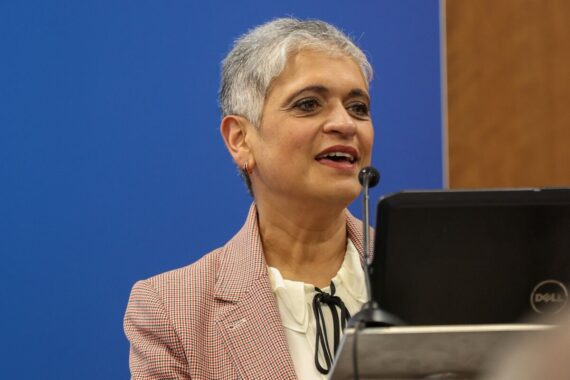RCGP chair Professor Kamila Hawthorne on the need to standardise green prescribing in general practice and the support required to get there
The climate crisis is increasing the pressures and challenges on the entire health system and there has already been some improvement in addressing the carbon footprint of NHS buildings. But the UK NHS is currently not equipped to deal with the health impacts of climate change and there are still significant hurdles to overcome if it is to reach its goal of becoming the first NetZero health service.
GP teams are already working hard to make general practice ‘greener’ and more sustainable. However, we desperately need more support if we are to make a real difference to a greener NHS and patient care.
That’s why the RCGP has published our new report, ‘Towards Greener Prescribing in General Practice‘, calling on the UK Governments and NHS bodies to invest in system-wide changes to reduce waste, help the planet and provide the best possible patient care.
Reducing carbon emissions in general practice is critical to a greener NHS, but there are other green healthcare interventions that can also lead to high standard care, improved patient experience, creating savings and less waste.
Greener prescribing is good for everyone and taking action to minimise prescriptions of medication is one of the most effective ways of reducing environmental impacts. This does not mean taking medications away from patients, but looking more at alternative evidence-based, non-medical interventions.
Primary care teams need the support, time and resources to carry out Structured Medicines Reviews (SMR) for every patient who needs one. This should ensure medications are effective, that suitable alternatives are considered, and that dosages are reduced when necessary.
Of course, many prescriptions are essential, and patient safety will always be the priority for general practice but there are also ways to reduce its impact on the environment. Medicines recycling and re-use schemes should be expanded across the UK, particularly focusing on inhalers, which are a big contributor to emissions. Electronic prescribing should be implemented across all UK NHS settings to reduce the use of paper prescriptions and unnecessary patient travel.
As well as this, preventative and alternative methods of care can reduce carbon emissions and minimise medication side effects, costs, and confusion for patients with multiple conditions who are managing various treatments.
There is also growing evidence that non-medical interventions can be positively impact the health of our patients and reduce the need for medication. Social prescribing, or connecting people to non-medical activities, groups, information or other support in the community, is increasingly considered to be another promising intervention for improving wellbeing.
We are therefore asking Governments across the UK to ensure sufficient investment in voluntary and community services which can provide non-medical interventions, with a focus on areas of high deprivation.
Alongside this, we are recommending that NICE and SIGN should update their guidelines to incorporate non-medical and nature-based interventions where evidence of benefit is available. Access to green spaces for example, has been linked to a decrease in the prevalence and symptoms of various chronic conditions, including anxiety, obesity, and cardiovascular disease.
We also need Government, NHS bodies and ICBs to invest in research and evaluation of interventions that aim to reduce the environmental impact of our service while providing the highest standard care to our patients.
General practice cannot tackle the effects of climate change in isolation. Years of underfunding and poor workforce planning have meant that our service is now at crisis point. This makes it difficult for practices to address overprescribing or take steps to reduce emissions, when our time is already so pressured.
The NHS published its Green Plan Guidance in February and we all need to be part of the changes needed calling on health bodies to set out their refreshed green polices by the summer. ICBs and their equivalents are a key part of the process of reducing emissions in primary care, and as a College, we hope we can be a part of moving this conversation forward.
By taking these actions to support the adoption of more sustainable prescribing, our health service can play a key role in addressing the climate crisis and help patients to stay healthier for longer.
Professor Kamila Hawthorne is chair of the Royal College of GPs













Er ok, now we know what the problems in GP are.
Phew, I thought it was down to disinvestment and deprofenisoniallisation. RCGP on the button as ever, fiddling whilst Rome burns.
Sorry about spelling de- professionalisation
Thanks, but paying too much tax already to fund this delusional nonsense.
As China pumps millions of tonnes of carbon into the air, Trump trashes the green agenda, and our top GPs are wasting time on THIS, while the NHS and GP in particular crumbles. Really, Kamila, are your serious?